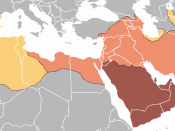Caliphate may be described as the office or jurisdiction of a caliph, or the state ruled by a caliph. Certain English usage of the term denotes it as a dynasty of caliphs such as the Umayyad Caliphate, but this is idiomatic and here we will deal with caliphate as the office. The caliphate encompasses legal, military and economic jurisdiction of the state, and at this level suggests a temporal office of political administration. But caliphate can also be viewed as a religiously-rooted concept, that is, it is inherently connected to the traditions and doctrine of Islam. This essay is an attempt to explain why the concept of Islamic caliphate underwent certain changes in terms of its background, its religious literal interpretation and evolving usage, its basis in religious legitimacy and its political character, throughout the rule of the Rightly-Guided Caliphs, the Umayyads and the Abbasids.
The religious, political and social background to the rise of the caliphate is of paramount importance in defining it.
The fact that Islam is doctrinally a world religion immediately politicises it and Islam in its purest form calls for a social structure and a leadership in which faith and state, din wa dawlah, are unified. During Muhammad's lifetime he was unquestioned leader of the Muslim community in religious and political matters by virtue of his status as rasul Allah, in which he was peerless. It would have been deemed impossible by Islam that any person, however devout, could inherit the divine authority of the prophet. Thus, the purely circumstantial view of the inception of the caliphate is that Muhammad's legacy demanded a successor that was essentially one thing: a central ruler to administer the establishment of an Islamic social order throughout the world. That supreme political rule should fall to a single prominent male...


